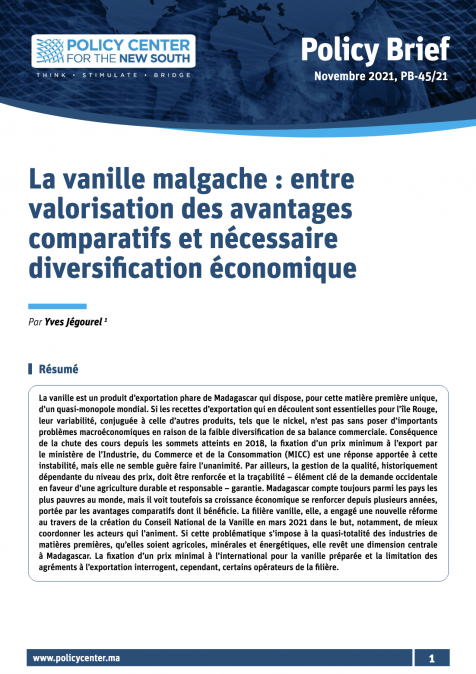RELATED CONTENT
-
Abdelaaziz Ait Ali et Marcus Vinicius de FreitasMarch 02, 2021The Covid-19 pandemic has severely damaged the global economy. Confinement policies, global value chains disruption and risk aversion in the financial systems markets have brought the glo ...
-
 AuthorsFebruary 26, 2021Economic development analysis must inevitably rely on a double methodological standpoint. On the one hand, it needs to search for common features, those general attributes that might be present in all national experiences of wealth accumulation, poverty reduction, and moving up the income ladder. On the other, in order to be meaningful, it must reckon with time and space. It must consider that those universal development traits will play out in specific historical and geographical c ...
AuthorsFebruary 26, 2021Economic development analysis must inevitably rely on a double methodological standpoint. On the one hand, it needs to search for common features, those general attributes that might be present in all national experiences of wealth accumulation, poverty reduction, and moving up the income ladder. On the other, in order to be meaningful, it must reckon with time and space. It must consider that those universal development traits will play out in specific historical and geographical c ... -
Fahd Azaroual et Moubarack LoFebruary 26, 2021L'Afrique a jusqu'à présent été épargnée par le pire de la pandémie de coronavirus en termes de cas et de décès, mais son économie n'a pas eu cette chance; en particulier les petits pays, ...
-
February 25, 2021خصص مركز السياسات من أجل الجنوب الجديد حلقته الاسبوعية لحديث الثلاثاء لمناقشة أجندة الاتحاد الأفريقي لسنة 2021: بين الأولويات والتحديات رفقة أسامة طيبي، باحث في العلاقات الدولية بمركز السياسات من أجل الجنوب الجديد. سيتعين على الرئيس الكونغولي مواجهة العديد من التحديات خلال فترة ولايته ا...
-
February 24, 2021L'intégration régionale en Afrique est considérée comme une priorité par de nombreux responsables politiques et acteurs économiques du continent. Avec la signature de l'accord portant création de la ZLECAf par l'ensemble des pays africains, le défi consiste désormais à mettre en place un marché continental pour les biens et les services et à jeter les bases d'une union douanière continentale. Nombreux sont ceux qui, sur le continent, considèrent la ZLECAf comme un plan d'investissem ...
-
 AuthorsFebruary 22, 2021The monetary policy report submitted by the Board of Governors of the Federal Reserve System to the U.S. Congress on Friday Feb. 19 showed that the Fed’s members have improved economic growth expectations for 2021 and 2022, expect lower unemployment rates. Meanwhile, only two of the 18 participants projected PCE (personal consumption expenditures) inflation to (slightly) exceed the 2% that serves as the longer-run objective for the monetary policy regime. In this context, is there ...
AuthorsFebruary 22, 2021The monetary policy report submitted by the Board of Governors of the Federal Reserve System to the U.S. Congress on Friday Feb. 19 showed that the Fed’s members have improved economic growth expectations for 2021 and 2022, expect lower unemployment rates. Meanwhile, only two of the 18 participants projected PCE (personal consumption expenditures) inflation to (slightly) exceed the 2% that serves as the longer-run objective for the monetary policy regime. In this context, is there ... -
Salma Daoudi, Larabi Jaïdi et Uri DadushFebruary 22, 2021Alors que la pandémie de COVID-19 a mis à nu l’avènement d’un monde désolidarisé, l’élaboration tant espérée d’un vaccin contre le nouveau Coronavirus n’a fait que porter cette désolidari ...
-
AuthorsFebruary 17, 2021La vanille est un produit d’exportation phare de Madagascar qui dispose, pour cette matière première unique, d’un quasi-monopole mondial. Si les recettes d’exportation qui en découlent sont essentielles pour l’île Rouge, leur variabilité, conjuguée à celle d’autres produits, tels que le nickel, n’est pas sans poser d’importants problèmes macroéconomiques en raison de la faible diversification de sa balance commerciale. Conséquence de la chute des cours depuis les sommets atteints en ...
-
February 16, 2021Alors que la pandémie de COVID-19 a mis à nu l’avènement d’un monde désolidarisé, l’élaboration tant espérée d’un vaccin contre le nouveau Coronavirus n’a fait que porter cette désolidarisation à son paroxysme. En effet, la course vers l’accaparement des doses de vaccin a mis en lumière...
-
February 16, 2021خصص مركز السياسات من أجل الجنوب الجديد حلقته الاسبوعية لحديث الثلاثاء لمناقشة قانون الشغل والحماية الاجتماعية في ظل أزمة كوفيد 19 رفقة محمد طارق، أستاذ القانون الاجتماعي بجامعة الحسن الثاني بالدار البيضاء. في هذه الحلقة سيتم تحليل وضع المغرب فيما يتعلق بالمجال الحماية الاجتماعي خاصة خلا...





